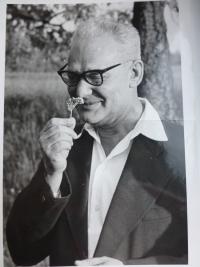The coup should have come in 1968, because in 1989 we were already too damaged as a nation

Download image
Jiří Novák was born on August 18, 1937 in Prague as the eldest of four siblings. His father was a history professor Antonín Novák, who had a scrape with regimes during the first and second world war. The family had to move involuntarily several times and in 1953 father Antonín v was arrested due to his anti-communist opinions. He was sentenced to eighteen years of prison a year later in an artificial process. Jiří Novák experienced the first repressions still as a student, had to be interrogated and later during graduation and entrance exams to high school. When he had to go to the army service, he was selected to the auxiliary tank troops. He experienced bullying at work too. He worked in a health hazardeous operations of a chemistry factory in Pardubice. After the atmosphere got more relaxed in 1960s he tried to study again and was accepted to the High School of Chemistry and Technology, which he managed to study along with his employment and finished in 1970. In August 1968 he was at traveling on business to Yugoslavia, but decided to come back to the republic. In 1979 he finally got a qualified job in Kamenoprůmysl. At the moment he´s an active member of the Prague Academic Club 48.


